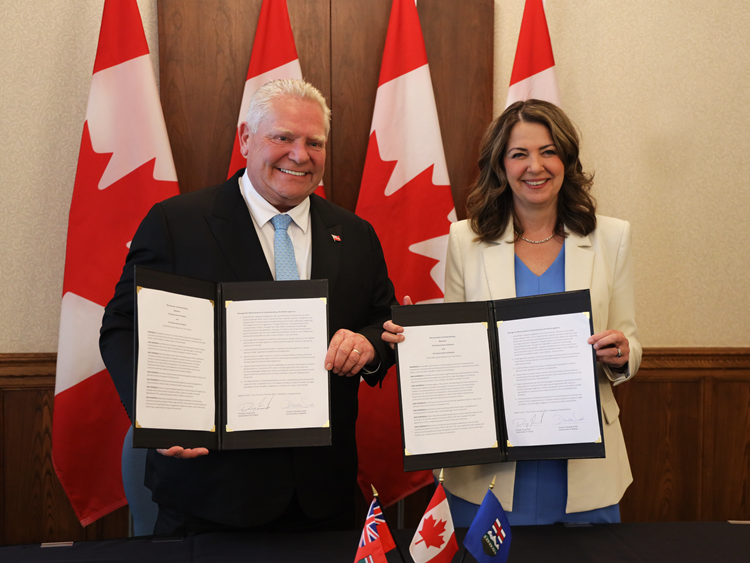
Premier Danielle Smith and Ontario Premier Doug Ford signed the memorandum of understanding (MOU) while in Saskatoon, Saskatchewan for a meeting of Canada’s First Ministers June 1 to 2.
The agreement will see Alberta and Ontario partner to improve the free flow of goods and services between the two provinces. It will also simplify requirements for regulated professions such as skilled trades, making it easier and faster for professionals to work across provincial borders. In addition, the agreement will allow direct-to-consumer sales of Ontario-made and Alberta-made alcohol between the provinces.
Through the MOU, Alberta also welcomes the possibility of working with Ontario and signatories of the New West Partnership Trade Agreement (NWPTA) to explore the potential of welcoming Ontario to into the agreement’s fold. The NWPTA has been foundational to improving the movement of goods, services, investment and workers between Alberta, British Columbia, Saskatchewan and Manitoba for the past 15 years and counting.
“Together, Alberta and Ontario are taking a big step toward a more open, competitive, and united economy. This agreement is about getting results, making it easier for people to work, do business, and grow across provincial lines. It’s time to stop letting outdated rules hold us back and show Canadians what real economic leadership looks like.”
“With President Trump threatening our economy, there’s never been a more important time to boost internal trade and cooperation between provinces. By agreements like this and working together, we’re helping Canada unlock up to $200 billion in economic potential and standing shoulder to shoulder to protect the future of Canadian workers across the country, not just in Ontario.”
The MOU is based on the key principles of opening up Canada’s economy to respond to pressures from tariffs and other protectionist measures that are threatening Canadian workers and businesses. Alberta and Ontario are fully committed to improving Canada’s economic performance and advocating for the federal government to address the underlying conditions necessary to strengthen Canada’s economy and diversifying its markets, including repealing or amending the Impact Assessment Act, Oil Tanker Moratorium Act, Clean Electricity Regulations and the proposed Oil and Gas Sector Greenhouse Gas Emissions Cap Regulations.
A First Ministers' Meeting is a gathering of the Prime Minister and provincial and territorial premiers. These meetings are called by the Prime Minister on an as-needed basis to discuss issues of national importance and concern.
Quick facts
- Alberta is a leader in removing barriers to internal trade, labour mobility and investment across Canada.
- Alberta’s commitment to remove its party-specific exceptions to the Canada Free Trade Agreement (CFTA) has helped facilitate even greater access to the Alberta market for Canadian companies in the areas of government tenders, Crown land acquisition, liquor, energy, forest products and more.
- In 2019, Alberta:
- Removed 21 of its original 27 exceptions, including all procurement exceptions, representing 80 per cent of Alberta’s exceptions under the CFTA at the time.
- Narrowed the scope of two of its retained exceptions to enhance Alberta’s open and competitive liquor market and better reflect the regulatory framework for Alberta’s forestry sector.
- Alberta only has eight remaining CFTA exceptions, which are in place for essential regulatory and safety purposes, which include:
- Two exceptions for alcohol regulation in the province under Alberta Gaming, Liquor and Cannabis;
- Two exceptions for preserving the regulatory framework for Alberta's forestry sector;
- One exception that allows Alberta to properly manage and collect royalties in its upstream energy and minerals sector;
- One exception for the management and disposal of hazardous materials; and
- Two new exceptions that were added in 2024 to allow for the management of legalized cannabis.
Related information
- alberta.ca/freetrade
- Memorandum of Understanding between : the Government of Ontario and the Government of Alberta - Open Government